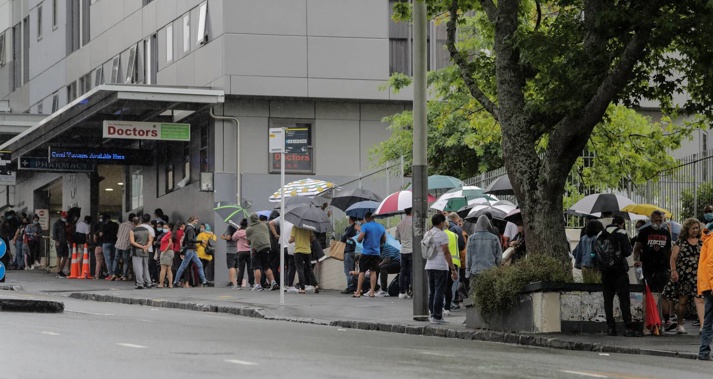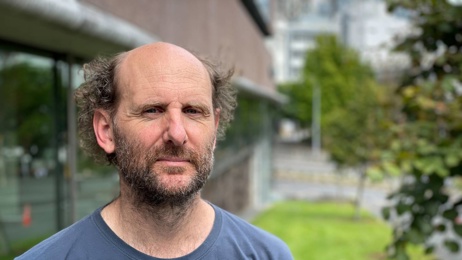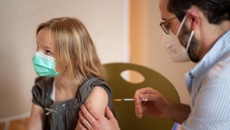
OMICRON LATEST
* 'We are all good': Motueka family on catching Omicron
* How did this outbreak start? What we've learned so far
* Auckland hotel, Rainbow's End theme park named as locations of interest
* Why some people don't get Omicron when others in their household are positive
* 'Operation Do Your Best': Gloom looms over capabilities of NZ's grocery supply chains
A major new strategy in the fight against Omicron has been welcomed but could face severe strain if case numbers overwhelm contact tracers.
The technology allowing cases to be identified as Omicron, Delta, or other strains has previously been limited to international arrivals.
But as 19 people were confirmed to have Omicron yesterday, the Government announced the expansion of whole genome sequencing to border-related workers and their families.
Te Pūnaha Matatini complex systems researcher Dr Dion O'Neale said it was just about impossible to know how widespread Omicron was right now.
"It's almost certain that this is going to take off and get big," the physicist said.
He welcomed the move to broaden sequencing, which could determine the similarity of infections from different people.
But its effectiveness in weeks ahead would rely on an intricate series of other events, and ultimately, it seemed likely contact tracing would have to be refined.
O'Neale said once hundreds or thousands of cases were appearing, contact tracers would have to make judgment calls on who to track down, and who to ignore.
"It depends how vigorously you're contact tracing."
He said in last year's Delta outbreak, the tracing system was stretched at about 100 daily cases.
But then, interviews with contacts were extensive.
O'Neale said in an Omicron scenario, investigators might be told an unknown person shared a bus with a positive case.
"Do you spend half a day trying to track down that person, or do you say: We're going to move on?"
And some contact networks will be much simpler to pin down, he said.
"For example, if someone was infected and they were at work, it was relatively easy to contact trace who they were at work with."
Dr James Hadfield, Wanaka-based sequencing expert with Seattle's Bedford Lab, said the expansion of whole-genome sequencing was a crucial step.
"It's hugely important. The cost is worth every penny," he said. "There is a lag but the information is so valuable."
A common PCR swab test can be sent to Environmental Science and Research, which then conducts sequencing.
"One of the things that genome sequencing allows us to do is to identify whether a positive case at the border, at the community, is Delta, is Omicron."
Hadfield said in every country, sequencing faced limits.
"If we are in a situation where we have thousands of Omicron cases a day in New Zealand, we don't have the sequencing capacity to sequence that many cases."
And Hadfield said most rapid antigen test users would never get their results sent for genome sequencing.
The rapid tests, or lack thereof, have sparked intense political debate, with the National Party saying the Government had been hopeless at helping businesses get the kits.
And Hadfield said despite the attention Omicron was getting, the Delta strain still posed a threat.
"We are potentially going to have to deal with simultaneous Delta and Omicron outbreaks."
Most current evidence suggested Omicron is more transmissible than Delta, but is less frequently producing severe illness.
University of Otago epidemiologist Professor Michael Baker said the Government was currently applying the same approach to Omicron as it did to Delta.
"We've applied a tight suppression to Delta and it's worked remarkably well," he said.
He said whole genome sequencing could now be used on every Omicron case, but probably not for much longer.
Prime Minister Jacinda Ardern on Sunday said the fight against Omicron would be phased, with the first stage when daily cases do not exceed 1000.
The second phase is transitional, adjusting the focus to those at greater risk of severe illness from Omicron.
The third stage, if cases are in the thousands, will redefine tracing, contacts and isolation requirements.
It is expected the Government will reveal some third stage details tomorrow.
The new Omicron cases reported yesterday included eight in the Nelson-Tasman region, five in Auckland, and one in Palmerston North.
Other Covid-19 cases included four each in Kaitaia and the Waikato.
Meanwhile, staff and residents at an Auckland aged care facility in Flat Bush were tested after a worker who tested positive was linked to the current Omicron outbreak.
A new drive-through vaccination centre will open today in west Auckland to accommodate increased demand for booster doses.
The Northern Region Health Co-ordination Centre said the centre on the corner of Gunton Drive and Tawhia Drive in Westgate will open from at 11am.
From tomorrow, it will operate from 8.30am to 3.30pm, every day.
Take your Radio, Podcasts and Music with you









